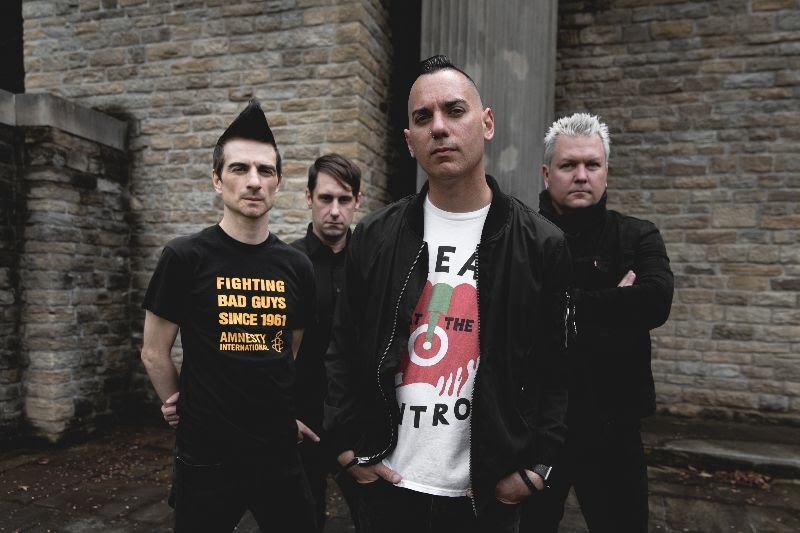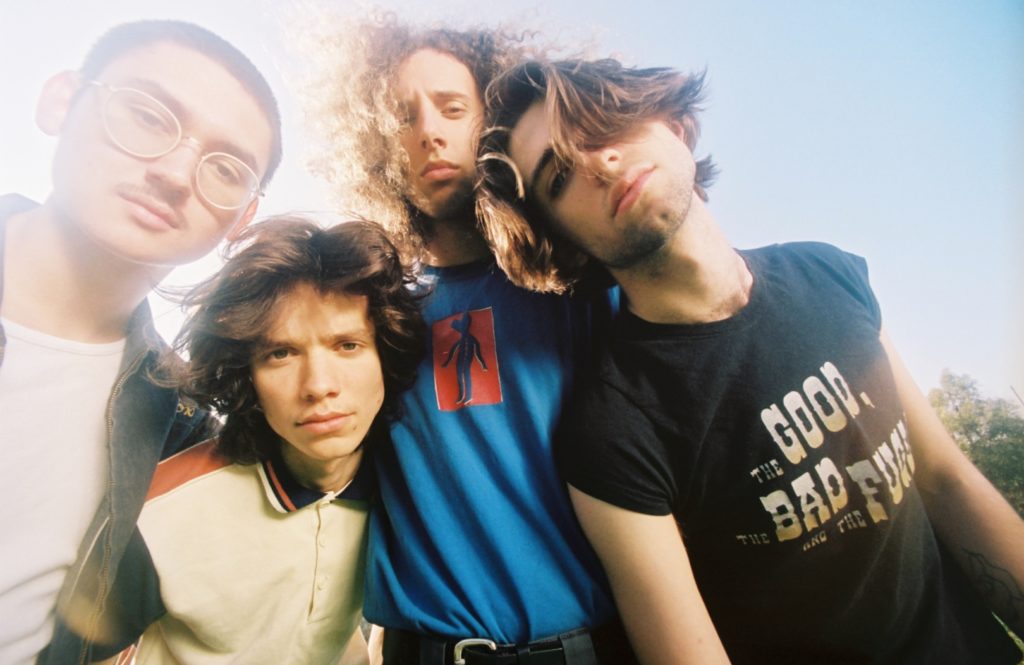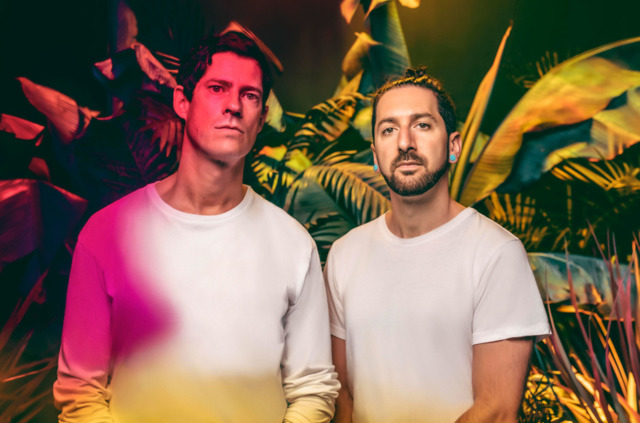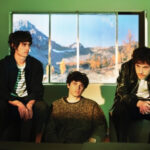Pittsburgh, Pennsylvania’s Anti-Flag has long been a loud voice in the punk-rock community, standing up whole-heartedly for what they believe in. The band — comprised of Justin Sane, Chris #2, Chris Head, and Pat Thetic — is just as well known for their activism as they are their music, mainly because these two things intertwine so elegantly and perfectly. It’s something you may naturally expect from a band titled Anti-Flag, but what separates them from some of their peers is their impressive consistency throughout their career.
Some may look at the band as anti-American, but they’ve been clear all along that they’re not anti-American. Instead, they’ve long since discussed they’re anti-nationalism, anti-war, and more than anything, they stand for unity. Some may call them democrat leaning, immune to calling out democratic leaders — but as Sane points out to me during our interview, this isn’t at all the case. “We have a Bill Clinton song, we have George Bush songs, we have Barack Obama songs — especially when it came to drone strikes and the surveillance thing,” he highlights to me. Of course, our interview isn’t specifically about any of those people — more so, it’s about their new record 20/20 Vision (out January 17th via Spinefarm Records), which was announced back in October.
Anti-Flag pulls no punches when it comes to 20/20 Vision, one look at the album artwork and the opening of the first track “Hate Conquers All” will let you know the journey you’re about to go down when you listen to the record next month. That’s really where the conversation between Sane and I starts, as we dive into the influence that Donald Trump has had on their record and overall band.
Throughout their career, with those aforementioned callout songs across the political landscape, it’s worth noting that Anti-Flag have never specifically called out a president quite like they do with Donald Trump on 20/20 Vision. For a variety of reasons, with one example being that they didn’t want to date their songs and wanted to keep them relevant as time went on. “It came about pretty quickly,” Sane tells me when I ask about how long it took them to decide to write a record like this about Trump. He specifically calls back to infamous white supremacist rally in Charlottesville, North Carolina, in which Trump defended the rally citing that there were good people on both sides of that rally.
There’s a common saying that Trump is a symptom of a greater problem, that he’s just a symptom of the disease — this is something that Sane believes to be valid. “I mean, kind of this neo-liberal, laissez-faire, capitalist system — I think that really is ultimately the number one problem that we have, especially in America when it comes to inequality, and when it comes to power,” he begins to tell me, “Donald Trump is that symptom. When you have neo-nazis saying that ‘Trump is a figure in which we can all rally around and that, you know, can be a figure head with our movement,’ such as the shooter at Christchurch, right there it became pretty obvious that Trump’s just not a symptom that you can ignore right now; he’s the main symptom.” Being a symptom that you can no longer ignore, Anti-Flag felt it was the necessary time to blatantly write how they feel, putting names to the lyrics and faces to the art.
When I say “faces to the art,” I don’t just mean figuratively, I mean literally. The album artwork for Anti-Flag’s 20/20 Vision finds a picture of Donald Trump crossed out with red x’s, the name Anti-Flag, and “20/20 Vision” labeled across. Longtime friend and collaborator Doug Dean designed the album artwork, and it’s something he came up with after the band sent some demos and lyrics — once he showed it to the band, it was a quick “yes” all around. “I love that when you look at it it makes you feel uncomfortable,” Sane explains on the album artwork. “I feel like that’s a really great metaphor for so much of the kind of chaos, and it just — I would almost say, like, the pain and suffering that the Trump administration has brought for a lot of people. People feel overwhelmed and uncomfortable because they can’t always point out exactly what part of it is disturbing them because there’s so much that’s disturbing to them, whether it’s because of kids in cages or a roll-back of environmental protections, and, you know, so it’s the fact that they’re not only ignoring the fact that we’re facing a global climate crisis, but they’re actually doing things to speed up the downfall of our environment.”
The artwork sets the tone, but then 20/20 Vision opens with the unapologetically ferocious “Hate Conquers All.” The track open with a sample of Trump’s speech where he discusses how protestors used to have things much worse compared to modern-day protestors. For an album like the, there was no shortage of speeches/quotes that they could have pulled from, but this one stuck out to the band for a few reasons. Sane explains this specific speech stuck out because it exemplifies how Trump always is malicious, violent, inhumane, and is rarely benevolent. “It also pokes holes in this idea — he’a always talking about [how] he wants to go back to this great time, and this great time he’s talking about is a time of terror where people should be roughed up and beat up,” Sane explains before continuing, “The quote in itself, especially for today, it’s not nearly as full of vitrol and anger as a lot of things Trump has said since then. I think that that kind of shows, in a way, that quote sort of feels like an underplay, but I think that it also shows how much Donald Trump has normalized division and anger and violence.” It’s something that we both agree is ironic when you see Trump supporters getting behind some of these sentiments, given that at it’s very core, a lot of it is fairly against American principles. “It’s literally endosring violence, and political violence, Which, you know, is an authoritarian practice. That’s something in our democracy, and in our American history and our traditions in America, that we’re supposed to reject political violence, and he’s encouraging political violence. It’s sort of like a banana republic dictator would do,” Sane tells me.
While there’s some irony there, it’s not driven by a lot of humor. As Sane points out, there’s some real repercussions to some of the things that have been said and done by Trump in his time in the oval office. The headlines keep coming, but at a certain point, we all became slightly desensitized to the whole thing. It became a process of see the controversy react to it, forget and move on until the next part comes to life. Sane recalls a recent time in which he was watching The Late Show with Stephen Colbert where Colbert was going over some things Trump said lately and “I couldn’t even laugh at it because it was so just horrible. I was like, this isn’t even funny to me because it’s just beyond the pail that I can even laugh anymore.”
When it comes specifically to Trump’s policies or how things have been damaged, potentially beyond repair, two things come up during our conversation. Sane brings up the economic system in which Trump comes from, and that he feels Trump supports the worst economic systems, especially when it comes to ones that are equal. “We have this iant tax cut to the richest people in the country. Of course, the economy in which he’s always kind of been a part of and flaunted, is one that has really preyed upon vulnerable people,” Sane tells me. We bond over our shared frustration and confusion that Trump was able to reel in the middle class to support him, especially given his background. Specifically regarding this, Sane says “Even just this idea that he ran on, ‘I used bankruptcy laws, I’m a good business man!’ He left a lot of people holding the bag, those bankrupcty roles were set up to protect really wealthy people. It’s just kind of amazing that not even politically has he gone into the most ugly areas in the most gutter kind of politics, he is the product of a really ugly economic system that he participated in, and a lot of other people participated in it, and it has led to this.
Sane also tells me the story of when Anti-Flag played a show in New York on Halloween Night, and a fan told them about how they go to college in the area and watched ICE come in and take an undocumented student right out of the library in front of everyone. There are plenty of horror stories like this that exist, and ICE setting up a fake university to lure in immigrants who are here on student visas, and then arresting them, should not go without being mentioned. But for Sane, hearing a story like this directly from a fan just sort of hit differently, as the fan even compared it to the Gestapo coming in the 1930’s in Germany — coming into a university to take a student. Sane told me that this fan told him nobody knows where they took this undocumented student or what’s happening to them, they’re just gone. “This is modern day America,” Sane says, “and we don’t know how many people that’s happened to.”
“You realize, like, lives are literally being destroyed. Whether it’s LGBTQ people seeing their suicide rates going up in that community — you’ve seen obviously what’s happening with undocumented people with kids being put in concentration camps, so, it goes on and on,” Sane says when voicing his frustration and dismay with how the United States is currently operating under Trump’s administration. He references an incident of domestic terrorism that happened in his hometown of Pittsburgh, at the Tree of Life – Or L’Simcha Congregation back in October of last year, and how Trump is influencing these people by his words. “The person who committed that crime just citing the language that Donald Trump has used [matters],” he explains to me. “There’s these violent — you know, the president’s words do matter, they kind of make an impact on people. When they’re put into this right wing media chamber, then they’re echoed and they’re amplified, and they become that much more powerful. We realized there’s a lot of people that are being influenced toward violence as a result of this presidency.”
All of these things boiled up inside of the members of Anti-Flag, and nearly every day as these terrible things keep happening, it’s harder and harder to ignore. I posed to Sane that 20/20 Vision is the most direct political record in punk since Green Day’s American Idiot in 2004, and how that’s a very important thing to see at this time. He jokes that they don’t have the audience reach that Green Day do, but also is quick to admit that “There’s definitely people in the activist world and in the political fray who have come out hard and have done far more amazing work than what we’ve done by making this record.” Their main focus, as Sane tells me, was to just document what is happening in this current time, and do their best to mark their place in history on where they stood while making a statement about what they believe is right and wrong. When reflecting back on the differences between those Bush years and this current political landscape, as far as political statements in music, Sane feels like Anti-Flag is more on an island now than they were back then — in that they feel more alone as a band willing to make a political statement through their music. “There’s not a hell of a lot out there, especially in the mainstream,” he says talking about artists not putting their political views in their music as much. Its important to note that Sane isn’t saying these things to criticize other artists for what they choose to write about, or that he feels like they should be doing these things, but instead he’s just pointing out the differences in these two eras. While Sane points these thing, he does explain to me that he thinks there are a few reasons why. “I think for one, a lot of people tend to now go to social media as that voice in a way that people didn’t even 8 years ago, and that’s fair. Also, we talk to a lot of musicians and people who are like, telling us they just don’t really know how to address it. It’s like they want to say something but it’s not really what they normally do with their music and their art, so they’re finding other ways to address it. I think with a lot of musicians it’s coming out in their statements on social media, but it’s not in their music as much,” he explains understanding the challenges that some others may face if they’re not used to doing these type of things. But, as Sane points out himself, for Anti-Flag, it’s just what they do. “And we did it during the Obama years, too. It’s just that Trump is far more in the media, he’s just a higher media presence. He’s literally committing crimes and lying constantly, so he definitely represents a much bigger enemy, I think, for the majority of Americans much more than Obama did, so I think people are [just] paying attention more,” he explains.
For as much as 20/20 Vision is a commentary on modern-day America and the Trump administration, there are a few songs on the album that aren’t necessarily about Trump and politics in general. One example of this is the song called “The Disease,” which for full transparency, after listening to the record, I thought was still a song about Trump — especially after hearing Sane describe Trump as the main symptom of a disease. Instead, the song focuses on the punk community and what that means to Anti-Flag as a whole. “With our music we’ve always seen the punk community as much bigger than our music as a band. And that was really what drew me into punk: the community element of it. I could go to a show and be included even though the rest of society considered me a misfit. I found a place in punk rock where people looked at me and they were like, ‘Oh that’s really cool, you have a different way of seeing things, what other people see as you being a misfit we see as a strength and something really cool.’ So I really found a home in punk rock in that way, and a lot of artistic freedom,” he tells me. Before explaining that “‘The Disease’ is primarily kind of about that community and that idea of whether it’s in music or art in general, if you are willing to stand up to the status quo and power, then this is the community for you. So the song is not meant to be limited to the punk rock community or the punk rock world, but primarily that is the statement that we’re talking about. Talking about undermining the status quo and finding ways to be outside of it.”
“Don’t Let the Bastards Get You Down” and “Unbreakable” are two songs that I bring up that I feel were less political commentary, and more just songs that serve as revolutionary anthems for those fighting back. This is something he says that he’s happy to hear me point out, as these are important tracks to them. Sometimes we all struggle in our personal lives, whether it be in a relationship or financially, and sometimes just getting through life can be a hard task on it’s own, and then if you turn on the news or start reading about the current news, you’re bombarded with so much more negativity. That’s where these two songs specifically lay and come into play, as Sane tells me, “I think that we felt like it was really important to offer some optimism on the record.” He goes on to explain that there has to be some sort of positivity to look at, as that will be what carries us through. “Sure, we can all acknowledge the ugliness and dystopia and bigotry, but we need some optimism in our lives, too. Just to let people also know that you’re not alone. Just to let people know that sometimes I feel like, ‘Ah, fuck, this is all so much.’ Then I play a song that makes me feel good like ‘Unbreakable’ and I’m like ‘but we can make it!’ and I hope that song might do that for somebody else. So for those reasons, we wanted to offer some songs that add some positivity too. I think there’s really some different direction for where we can point our compass for the outcome of our society. Music can help us get there at least, like, psychologically and spiritually,” he finishes.
Interestingly enough, before our conversation, I saw someone I went to high school with sharing something on social media about bringing Christianity back into schools, and how the bible should be taught to everyone. Anti-Flag’s “Christian Nationalist” covers this exact kind of sentiment, and when I share with Sane that story, his first reaction is humorously expressing, “You [just] made me think of like 400 different points.” We talk about the popularity of Christian nationalism in political figureheads, before both sidetracking a little bit.”I think it’s just really interesting that the Republicans will never challenge Trump,” Sane begins, “We always hear that there are Republicans behind close doors [and] they hate what’s happening, they really wanna say something but they know that if they do they’ll lose in the primaries. To be totally honest with you, I just don’t buy that.” He explains that this is because their ideologies line right up with Trump’s: “They want gay people to disappear, they want people of color to stay in their place, they don’t want women to have access to reproductive healthcare,” he says. Sane holds no punches when we get to discussing how Trump has benefited Republicans and America’s wealthiest persons, “I think that they agree with what he’s doing. He’s delivering what they couldn’t have delivered in their fucking wet dreams, and that’s why they don’t challenge him.” When you start thinking about the wealth gap between the rich and the poor in America, especially for recent history, it’s pretty astronomical. Sane points out how Jeff Bezos makes $215 million/hour, while also highlighting others such as the Koch brothers and the Walton family. “So with the song “Christian Nationalist” — I took a long pathway to come back to this — it”s a mainstream movement and it’s led by these people who are intense ideologue’s, there’s no exaggeration in the lyric about what they believe in and what they want,” sane explains on the song, “It’s all a political movement. It’s a dangerous, dangerous political movement in this country, and of course around the world.”
“Resistance Frequencies” is the last song on 20/20 Vision finds Anti-Flag posing a question back to the listeners: what side will you be on? They take you through a journey of the current political landscape under Trump, and offer their takes and opinions on all of it throughout the record, but ultimately, they know they cannot do it on their own. It will take more than just four guys from Pittsburgh, Pennsylvania to cause change in this country. “When we come together collectively, we really can overcome this, but it really does come down to being willing to take a stand,” Sane says on the meaning behind the track. There are certainly some instances of people coming together, there was the 2017 Women’s March right after Trump’s inauguration, or the unity that was felt amongst most of society when it was discovered that immigrant children were being put into camps and separated from their families. Of course, coming together now is certainly just the first step, while the next step would be actually voting. Sane also felt like it was important to make “Resistance Frequencies” feel like an upbeat song that feels good because “Making change can be a really good time. Activism can be a good time. When you’re a part of a movement, it can be exciting, it can be invigorating.”
I ask Sane if he feels like there is a candidate or path for this Trump administration to get out of office in this 2020 cycle. After all, the title-track on 20/20 Vision talks about this same thing, as it lyrically ponders when things will end and get back on track. “I think there is,” he shares with me, saying that change can come pretty rapidly, citing how quickly things changed with Trump. “Part of the reason Trump won was because people were really dissatisfied with 30 years of neo-liberalism, you know? It’s just the Trump people were looking for a solution in the wrong place,” he explains. He goes on to cite his own experiences from his hometown and explains that a lot of people he knew were going to vote for Bernie Sanders or Trump: “They just saw [Hillary] Clinton as representing this old economic system that has left them behind with $7.25 an hour minimum wage and healthcare that doesn’t really get the job done, and just a growing wealth gap.” That allowed for Trump to just come in and convince everyone he was the outlier, that he was going to quote unquote drain the swamp. “That came fast and hard because people are really looking for a solution, [but] a lot of people haven’t found it with this administration.”
But at the end of the day, no one can predict the future — not even someone like Sane who is so brilliantly immersed into what’s going on around all of us. He mentions that he’s not sure if this will be an election where we take four further steps back, but, there’s optimism that with the 2020 cycle, it could wind up being a step in the right direction. “That’s a big part of why we wanted to get a record out now. We pushed ourselves to make this record and get it done and put our flag in the sand of history. We thought if there’s ever a time where we want to try to present our argument to people as we see it, this is it,” he says.
Our conversation ends with a reflection on where things currently are. A big thing for Sane and a lot of others is the climate crisis, as that only is part of what makes this 2020 cycle so important. But, Sane recalls some headlines he saw before we started talking: “EPA slated to role back rules to protect water ways from toxic coal lash,” “Last Major Nuclear Arms Pact Could Expire With No Replacement,” “US gag rule on abortion silences most popular radio host in Nepal,” “In Milwuake man arrested in alleged anti-immigration acid attack.” These were just examples of a few headlines he saw in one day. “A lot of these things, especially environmental role back, even if you just look at it from those perspectives, never mind the people having their lives torn apart by ICE, or foreign policy that is really dangerous and creating a lot more instability than stability,” Sanes says before finishing our conversation, I think the election is really important.”
’20/20 Vision’ will be released on January 17th, 2020 via Spinefarm Records. You can pre-order the new record here.













